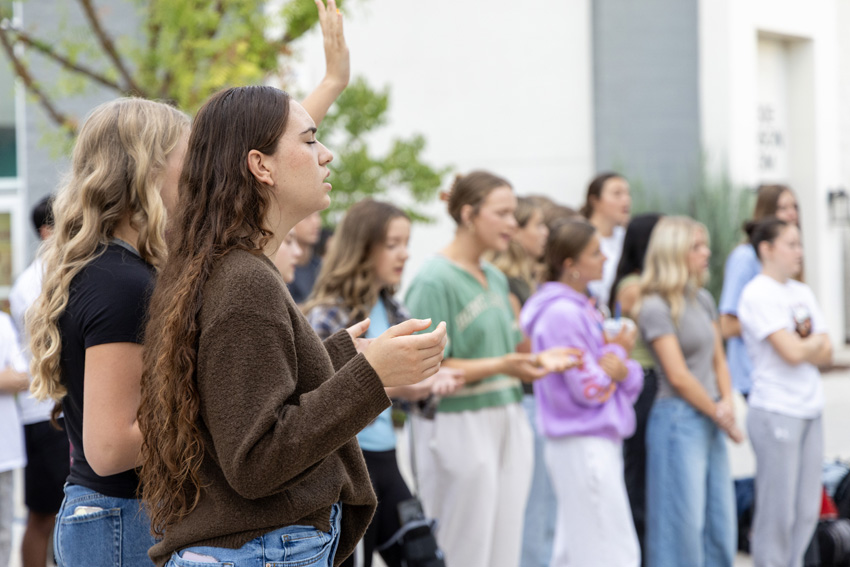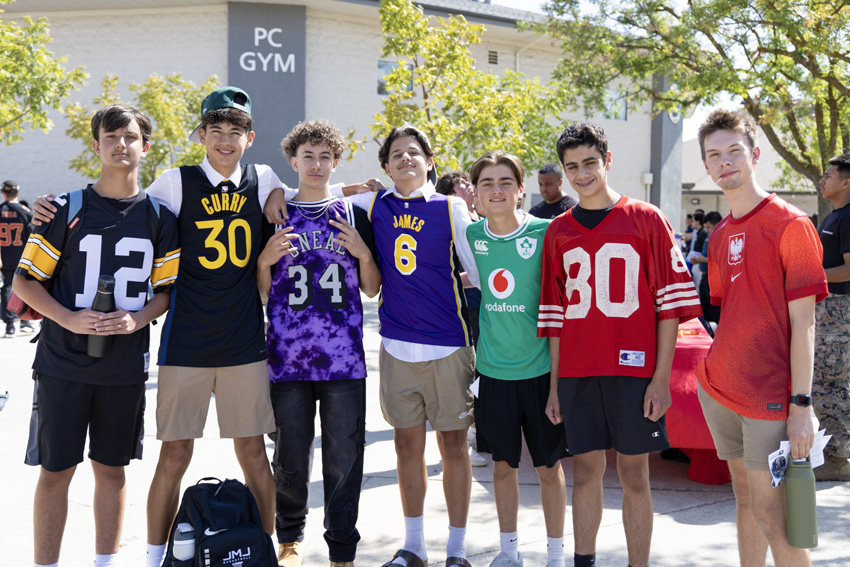PE teacher Mick Fuller demonstrates humane technique
Home economic students traveled to PE teacher Mick Fuller’s home to finish their food systems unit by processing chickens, Nov. 4. In total, the group harvested the carcasses of 10 chickens during the two-hour stretch.

Kimberly Bell, home ec. teacher progresses through her second year of teaching and continues to introduce new skills and techniques.
“Mr. Fuller approached me with this idea of processing chickens over the summer,” Bell said. “I’ve never done anything like this before and we study about it in our food systems unit so I thought it would be a great chance for students to see how their food is produced.
“Even though it was difficult getting over the yuckiness of it all,” Bell continued, “it is valuable for students to feel more of a connection to what they eat as opposed to seeing it in a supermarket and not knowing how it got there. Some students felt it would be too difficult for them to overcome those yucky feelings and images, so they chose not to participate.”
At first, Fuller showed students and parents the entire chicken process by first choosing a chicken, bringing it to the “cone of death,” cutting the neck, rinsing in hot water, plucking the feathers and with precise cuts, piercing the chicken to begin to pull out the insides.
Maintaining a personal garden and raising his meat birds, Mick Fuller believes society has lost touch with many of the fundamental life-sustaining activities that are vital to survival, specifically food production and preparation.
The farther we get as a culture from a knowledge of the natural origins and timeless methods of how we feed ourselves, the less we understand our role as stewards of the natural world and caretakers of the resources God has given us. The emotionally intense and visceral act of harvesting a living creature to prepare a meal for ourselves and our families can revive our awareness far more powerfully than any school lesson, youtube video, political movement or slogan. — Mick Fuller
“The farther we get as a culture from a knowledge of the natural origins and timeless methods of how we feed ourselves, the less we understand our role as stewards of the natural world and caretakers of the resources God has given us,” Fuller said. “The emotionally intense and visceral act of harvesting a living creature to prepare a meal for ourselves and our families can revive our awareness far more powerfully than any school lesson, youtube video, political movement or slogan.”
After the demonstration, each group member began the processing of their own bird. Jacob Provost, ‘18, explains how he felt about the harvesting of the chicken.
“This was my first time killing an animal, and I did not like it,” Provost said. “I could deal with de-feathering, cutting and gutting the bird but I hated the first step, actually killing the chicken. I probably wouldn’t do it again unless I had to, but I think it is important that everyone experience it sometime in their life.”
The Fuller’s progress through their fourth year of raising poultry for meat and also the seventh year of keeping chickens for egg production. He decided to keep a garden and raise animals to continue his family farming traditions and to reduce costs of groceries.
“I keep a garden and animals for food for several reasons,” Fuller said. “It makes economic sense for our family by somewhat reducing the amount we spend on groceries. It is also a way for me to maintain a connection with the farming traditions of my family.

“My grandfather grew up on a farm in Western Tennessee where his family lived a very simple agrarian lifestyle at the turn of the 20th century.” Fuller continued. “When he moved to California in the 1930’s he got a job as a mechanic working on large farm implements. He and my grandmother maintained a backyard garden for many decades, both as a hobby and for food. I believe that it is important for people to maintain at least some measure of self-sufficiency and not be completely dependent on factory systems to provide for their sustenance.”
Freshman Alexis Baker continues her first year in the home ec. class. She initially hoped to have a fun time with friends but instead learns many valuable life skills including the processing of a chicken. Baker was both nervous and thrilled about the experience.

“This was indeed the first time I killed an animal,” Baker said. “It was unfortunate because it’s a sweet little animal that is no longer living. I was scared mostly when we had to clean the chicken out because I’m easily nauseated and I was afraid to get sick. I was excited though because I really enjoy chicken, so it’s interesting to see the whole process.
“The grossest part of the day was either cutting off the head or cutting open its neck,” Baker continued. “Even though it was gross and sad I think it’s important to go through the process so we can understand where our food comes from.”
With the “Farm to Table” unit complete, the home ec. class shifts toward personal finances, budgeting and check booking beginning in the new semester.
For more articles read, Evening in French Polynesia luau provides cultural entertainment. Also, check out WWII veteran George Poplin shares story, inspires others.
The author can be reached via email: Braden Bell, Instagram and Twitter.





Mick Fuller • Nov 15, 2017 at 9:41 am
I am glad I had a chance to provide the home economics students with this opportunity. I had hoped that more students would participate. I think it would be good to have some kind of introduction to agriculture course at FC, ideally with a focus on so-called “sustainable” or small scale vegetable or animal production to help our kids understand both the changing food systems in our culture and also our God-given role as stewards of creation. This current generation of students has been given few opportunities to do anything other than function as consumers in our society. In this age of uber-eats and a universe of other web apps selling innumerable conveniences, it is imperative that we teach young people how to be self-sufficient producers of real, life-sustaining goods.
Kimberly Bell • Nov 15, 2017 at 8:37 am
This was quite an experience! I was so proud of the students’ bravery that day and their willingness to participate in something difficult. Ultimately, it is part of the life that God gave to us by giving us dominion over the animals. We are so far removed from that aspect in today’s culture that we don’t know how our food is produced, what it is consuming and how it had been treated in the process. In some small way, we felt a connection to all of this on that day, Nov. 4th, when we went through it together.